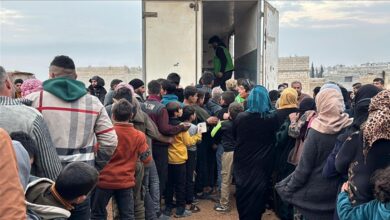
Demonstrations continue in Sweida province, and the European Parliament declares its solidarity with these protests
The popular protests in Sweida province continue for its third week with the influx of people into Al-Karama Square since the early hours to take part in the protests which call for the overthrow of the Assad regime.
“Suweida 24” local website posted a video showing people holding up a large portrait of “Sultan Basha al-Atrash”, which is a symbol of independence, over the Finance building overlooking Al-Karama Square. The protesters were shouting the downfall of the Assad regime and repeatedly chanting “Bashar out” which was sung by, Ibrahim al-Qashoush, the singer of the Syrian revolution.
The European Parliament announced its solidarity with the Sweida protests, calling for political change in Syria.
The members of Parliament said: “We, the members of the European Parliament, stand in solidarity with the brave men and women in Syria who are calling for freedom and democracy. We also hear you, see you, and stand with you. The political solution is possible, and it is time to implement Resolution 2254.”
The statement emphasized the importance of implementing UN Resolution 2254, which calls for a cease-fire and a political settlement in Syria.
The statement made it clear that despite the Assad regime’s desperate efforts to circumvent the people’s demands and end the protests, the protesters are insisting on their demands.
The statement pointed out that the current wave of protests includes a rich tapestry of the fabric of Syrian society, in which individuals from diverse ethnic and religious backgrounds participate. This ethnic diversity indicates that the movement is comprehensive as much as it is widespread.
The regions of southern Syria have been witnessing widespread and ongoing popular protests, for the fifteenth consecutive day, due to the Assad regime’s lifting of fuel subsidies, which caused surge prices, and an increase in the economic and living burdens on the Syrians, who have been suffering from the deterioration of their conditions for years.




